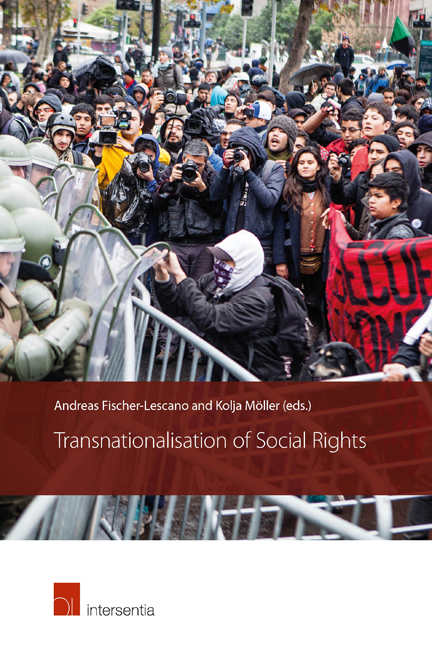Book contents
- Frontmatter
- Contents
- List of Contributors
- List of Abbreviations
- Chapter 1 Introduction
- PART I TRANSNATIONAL SOCIAL RIGHTS IN CONTEXT
- Chapter 2 The Struggle for Transnational Social Rights
- Chapter 3 Normative Perspectives on Transnational Social Rights
- Chapter 4 Conceptualising Transnational Social Rights: Developments and Forms
- PART II FOUNDATIONS, INSTITUTIONS AND ENFORCEMENT STRUCTURES
- PART III ENFORCEMENT OF TRANSNATIONAL SOCIAL RIGHTS
- Index
Chapter 2 - The Struggle for Transnational Social Rights
from PART I - TRANSNATIONAL SOCIAL RIGHTS IN CONTEXT
Published online by Cambridge University Press: 12 December 2017
- Frontmatter
- Contents
- List of Contributors
- List of Abbreviations
- Chapter 1 Introduction
- PART I TRANSNATIONAL SOCIAL RIGHTS IN CONTEXT
- Chapter 2 The Struggle for Transnational Social Rights
- Chapter 3 Normative Perspectives on Transnational Social Rights
- Chapter 4 Conceptualising Transnational Social Rights: Developments and Forms
- PART II FOUNDATIONS, INSTITUTIONS AND ENFORCEMENT STRUCTURES
- PART III ENFORCEMENT OF TRANSNATIONAL SOCIAL RIGHTS
- Index
Summary
THE TRANSNATIONAL SOCIAL QUESTION
Financial crises, food crises, environmental crises, migration crises: world society is facing dramatic challenges. These crises are both interconnected and rife with contradictions. While the Euro zone bailout fund is leveraged with roughly a trillion euro, nobody seems willing to put up the 13 billion dollars which, according to UN calculations, would be necessary to relieve world hunger. Deutsche Bank, a German high-street bank, generated a benefit of 4 billion euro in 2014; meanwhile more than 1.3 billion people around the world live in poverty, on less than 1.25 US dollars per day. Refugees find themselves in a particularly precarious situation. In 2014, there were more than 50 million displaced persons, a situation the UN High Commissioner for Refugees attributes to urbanisation, food and water insecurity, as well as shortages of raw materials. These global problems, he says, “are increasingly inter-related, exacerbating conflict and combining in other ways that oblige people to flee their homes”.
These trends point to one conclusion: the “social question” is now firmly a transnational social question. Societal conflict lines no longer run primarily along national borders. The global economy, global politics, transnational law, and global scholarship and science all contribute, in their own way, to the formation of zones of social exclusion. The axes of disadvantage can intersect and be exacerbated. The existing transnational power structures are both complex and merciless. Those worst affected do not even have – or are denied – access to the very means for sheer survival. Nation states no longer possess adequate solutions to these problems. Nor do they remain the only important players in this field. Sociologists and political scientists accept that the state is just “one of the actors” when it comes to global social policy, and acknowledge that non-state actors such as international organisations and global social movements have now firmly gained entrance to the “contested terrain” of emerging global governance. It is on this contested terrain that the debates on the crises facing world society are played out. It is here, for instance, that political scientists are making the link between climate change and global social policy. The interdisciplinary research group FLOOR (Financial Assistance, Land Policy, and Global Social Rights) explores the possibility of securing a global system of guaranteed basic income.
- Type
- Chapter
- Information
- Transnationalisation of Social Rights , pp. 11 - 48Publisher: IntersentiaPrint publication year: 2016
- 1
- Cited by



